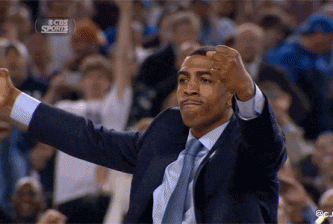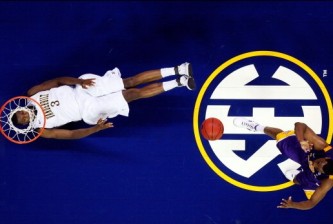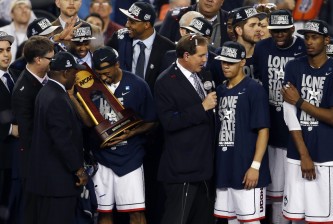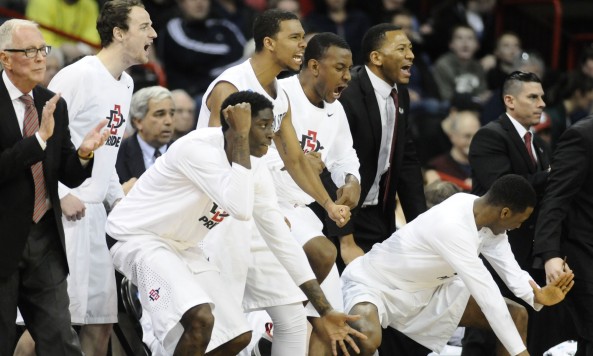They’re an established program, but not quite what you’d call a brand-name program.
They’re extremely good at what they do, but they don’t have a national following the way Gonzaga does.
They’ve made a history of their own in the past five seasons, but they play in the shadows of their city’s sports history.
The San Diego State Aztecs under Steve Fisher inhabit that purgatory between “everyone’s darling” and “the hated heavyweight.” They own an in-between identity whose burden is partly of their own making (in more ways than you think), partly the product of their conference brethren.
San Diego State was viewed to be a vulnerable 4 seed in the West Region’s opening-weekend pod in Spokane. Having scraped by New Mexico State in a jittery overtime game, the Aztecs refocused and demolished North Dakota State on Saturday. San Diego State’s offense produced a gleaming second half — one of the Aztecs’ best of the season at that end of the floor — and as a result, SDSU can once again call itself a second-weekend tournament team.
Next week at the Honda Center in Anaheim, Calif., the Aztecs and their coach get a chance to shed their burden and, in the process, forge a new reputation that could transform the way in which they’re seen — locally, regionally and nationally.
What are these burdens and pressures, these ghosts and shadows, that lurk wherever the Aztecs go?
Locally, the city of San Diego has been an “almost” place. The Padres made the World Series twice, but lost. The Chargers made one Super Bowl, but lost, and they’ve lost several painful AFC playoff games over the years. San Diego’s no Cleveland or Buffalo, but it is waiting for a crowning sports moment. The local reality in San Diego includes the Final Four. San Diego State has never reached college basketball’s signature event. The Aztecs have never even made the Elite Eight.
The location of the West Regional in Anaheim this year is fitting, because San Diego State brought an even better team to that city in 2011 for the West Regional semifinals, only to lose to eventual national champion Connecticut. Next Thursday, the Aztecs will play either Arizona or Gonzaga in a battle for Western United States bragging rights… and so much more. At least one team from the West will make the Elite Eight this year, but if it’s the Aztecs, the people of San Diego will be able to watch a game with Final Four stakes the following Saturday.
Those who have covered the Aztecs for many years know that making the Elite Eight is the first big barrier for this team. Just having the chance to play for the Final Four would mean a lot in the Aztecs’ own city.
Regionally, there’s a simple reason why next week’s San Diego State game in the Sweet 16 carries such profound significance: No Mountain West Conference team has ever made the Elite Eight — let alone the Final Four — since the league’s first season, the 1999-2000 campaign.
Utah made the national championship game in 1998… as a member of the Western Athletic Conference. Therefore, the Mountain West is still working on a Final Four bagel, while the Colonial Athletic Association (George Mason, VCU), the Missouri Valley (Wichita State), and the Horizon League (Butler) have all made the third and most coveted weekend of the NCAA tournament over the past 15 years.
The Mountain West sent Utah to the Sweet 16 in 2005; UNLV in 2007; BYU in 2011; and SDSU in 2011 as well. None of those four teams won, though, so San Diego State is carrying the banner not just for itself and its city, but for a band of brothers. BYU and Utah are no longer in the league, and those two fan bases (especially BYU’s) would probably like to see the Aztecs fail, but a lot of people throughout the Rocky Mountain region and the Western U.S. would take a lot of satisfaction from seeing a Mountain West team reach the Final Four and — at the very least — the Elite Eight. This is the regional pressure that will fall on Team Tenochtitlan’s shoulders in Anaheim.
The national significance of San Diego State’s journey to the Sweet 16 is found in two forms: First, non-Mountain West programs such as BYU and Gonzaga — programs with substantial basketball histories (the Cougars over several decades, the Zags over the past 15 years) — have failed to make the Final Four. San Diego State, should it reach the sport’s holy grail on April 5 in Arlington, Tex., would raise the West’s national profile. The Aztecs could, in the process, become more of a national magnet program. That’s a long-term benefit that could flow from a big performance in Anaheim next week.
The other national dimension of Los Aztecs is that their coach could, just after his 69th birthday (March 24), profoundly remake his reputation in the autumn (but oh what a brilliant autumn it’s been) of his career.
The rap on Steve Fisher — owning a measure of truth; how much is really where the heart of the debate lies — is that he’s been more recruiter than coach, and that better coaches get the best of him in tight situations, especially because his teams don’t run clean halfcourt sets. However, Fisher has certainly taught defense well, and he’s gotten his players to buy what he’s been selling on the Montezuma Mesa. The fact that San Diego State’s rise has been built on the no-glory elbow-grease aspects of basketball makes the Aztecs’ prosperity that much more commendable.
The reality of the situation (like the possibility attached to it) is plain for Fisher: After his fall from grace at Michigan, the man who was a central figure in college basketball in the early 1990s could — two long decades later — return to the promised land from a very different vantage point. If Steve Fisher can make the Elite Eight, he’ll win local and regional acclaim. If he can notch another Final Four, his career will receive a fresh re-examination.
The Sweet 16 is huge for every team that makes it. It’s also true that certain programs feel their seasons are wasted if they don’t make the Final Four. Yet, even within that larger climate in the realm of college basketball, few schools will have more on the line next week than San Diego State.























